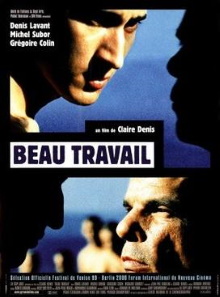This is another one of those films that has almost no plot, adapted from a short story by Herman Melville but transposed to a completely different setting and cast of characters. I don’t much care of what plot there is but I did find it fascinating in how this feels almost like a documentary, a sort of anthropological study of the soldiers featured here from an outsider’s perspective and even living in an exotic locale. I don’t believe that I will ever be a big fan of director Claire Denis but I do admit that her films are interesting.
Galoup, back to living in Marseilles, France, reminiscences about his time serving as a warrant officer in the French Foreign Legion in Djibouti. He professes admiration for his commanding officer Bruno Forestier without being sure of exactly why and despite the heat of the African country and the spartan lives they lead, it is clear that his memories are happy ones. The soldiers train together, exercise, perform basic chores like cooking and washing and often go to town to have fun. Galoup even has a local African girlfriend he seems happy with. The arrival of a new recruit in the unit, Gilles Sentain, is the point when things seem to go wrong for Galoup. Sentain never does anything wrong and has nothing against Galoup. Yet Galoup resents his presence deeply. Perhaps it is his youth and physical beauty or his easy camaraderie with the other soldiers in the unit but everything about Sentain seems to rub Galoup the wrong way. When Sentain is hailed as a hero for saving a fellow soldier after a helicopter accident, Galoup’s jealousy only grows worse and he swears to destroy the young man.
This may be a film about soldiers but there’s no combat in it and indeed no real conflict of any kind except the kind that takes place in Galoup’s own head. There’s no rational explanation for Galoup’s resentment though we can guess that there is a repressed homosexual attraction at play here. Indeed the homoerotic overtones in this film are hardly subtle, with the naked, muscular male bodies, their calisthenics that have a ballet-like quality and their combat exercises that involve bumping their bare chests against one another. At the same time, Galoup’s grievances feel insignificant against the everyday reality of the soldiers’ lives. The cinematography is fantastic and the rituals of the soldiers seem strange but also beguiling. More so than Galoup’s story, this film feels to me like a detached look at the lives of these soldiers, as if they were some strange species of animal. Even the local Africans seem to act the same way, peering and staring at the soldiers without talking to them. The local girls dance with the soldiers and congratulate one another on landing a Foreign Legion soldier as a boyfriend but there are no scenes of them engaging with each other on an emotional level.
While I can sort of understand what Denis is going for here, I can’t say that this appeals to me much. By design, neither Galoup nor any of the other soldiers are characters that the audience can easily identify with. I am also irritated by the lack of realism in how that unit is deployed and operates. Some of the actors in this film may well be authentic soldiers judging by their physical fitness and the realism of their exercises and training maneuvers. But the way this unit operates, being effectively unarmed most of the time, detached from any other units and seemingly bereft of mechanized support, feels so distant from the real world that it’s even harder to take them to be real soldiers. This is a kind of artist’s conception of the world to drive home a particular psychological point. I suppose that works sometimes but it didn’t work for me here.
We’ve watched a few films by Claire Denis by now and I can’t say that I really liked any of them. I can’t deny that she is auteur with a very particular artistic vision so I will probably will continue to watch her films since the critics keep raving about them. This one is probably the best among the bunch we’ve seen so far even if it didn’t really resonate with me and this is widely considered to be Denis’ best film so I suppose it might work for you.
